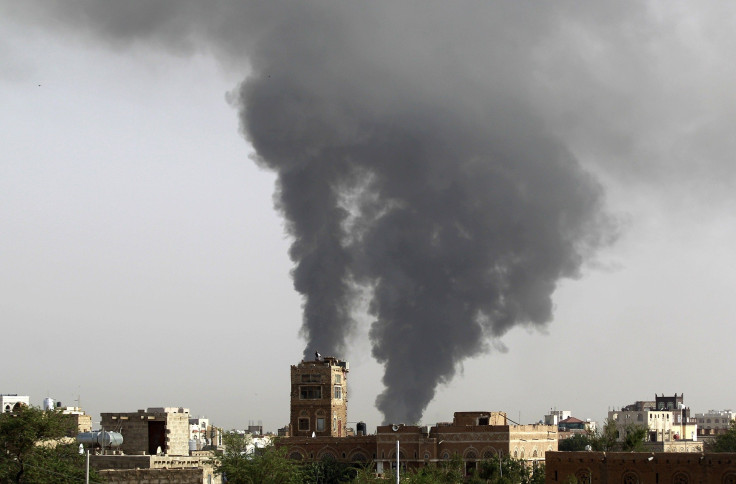Civilian Death Toll In Yemen Rising Amid Ongoing Violence Between Saudi Arabia Coalition, Houthi Rebels

Bombs from the Saudi Arabia-led coalition continued to rain down on neighboring Yemen Monday amid the start of a new round of ceasefire negotiations led by the United Nations Yemen envoy over the weekend. The airstrikes targeting Yemen's Houthi rebels came as the U.N. released new data on the number of civilian casualties since the military campaign began in March.
The U.N. team in Yemen was able to document “human rights violations and abuses and violations of international humanitarian law by all parties to the conflict,” U.N. spokeswoman Cécile Pouilly said in a press release Tuesday. She added that “humanitarian access remains severely constrained by recent violence.”
Violence between Saudi Arabia and Yemen’s Houthi rebels has killed 1,528 civilians and injured over 3,600 civilians since March, the U.N. High Commissioner for Human Rights said on Tuesday. Airstrikes have frequently hit civilian areas and have made it incredibly dangerous for the few humanitarian groups left in the country to continue their relief work.
From June 17 to July 3, airstrikes killed at least 92 civilians, including 18 women and 18 children, according to the U.N. And the death toll continued to rise after that.
إنفجار في مدينة البيضاء قبل قليل بجوار إدارة الأمن التي يتخذها الحوثيون مقراً لهم pic.twitter.com/gcobkqy1Nw
— عبدالله النهيدي (@alnohydi) July 7, 2015
On July 4, airstrikes hit a crowded marketplace north of Sanaa in the Harad District, killing at least 20 people and injuring more than 67 people, according to Medecins Sans Frontiere (MSF). On Monday night, the Saudi Arabia-led coalition launched an attack on a Houthi-controlled military airport in the Yemeni capital of Sanaa. The attack came just hours after airstrikes hit a civilian marketplace in Taiz, south of Aden and a Houthi rebel stronghold, severely wounding at least 23 people
"It is unacceptable that airstrikes take place in highly concentrated civilian areas where people are gathering and going about their daily lives, especially at a time such as Ramadan," Colette Gadenne, MSF head of mission in Yemen, said in a press release.
U.N. Pushes For Ramadan Ceasefire
The U.N. is hoping to broker a ceasefire that would hold until the end of the holy month of Ramadan in mid-July. Fighting has prevented many humanitarian organizations from working in the area.
As of June, there are 2.6 million children vulnerable to contracting measles, 1.3 million children exposed to a variety of acute respiratory infections and more than 500,000 children under the age of 5 at risk of severe malnutrition, according to the U.N.
"We are hoping to secure a humanitarian truce quickly, which could pave the way for a peaceful settlement of the crisis,” U.N. envoy Ismail Ould Cheikh Ahmed told reporters on Sunday. “It has turned into a catastrophe."
In March, Saudi Arabia and nine other countries launched an air campaign against Yemen’s Houthi rebels, widely believed to be working with Yemenis loyal to ousted dictator Ali Abdullah Saleh as well as operating as Iran’s proxy in the country.
Last year, the Houthi rebels seized the capital and much of the country’s northern provinces, essentially forcing former U.S.-backed Yemeni president Abed Rabbo Mansour Hadi Hadi to step down. Hadi fled to Saudi Arabia in March just hours before the air campaign started.
Since March, MSF has received more than 2,800 injured people in the port city of Aden alone, many of whom are women and children. The organization’s facilities in Taiz received at least 2,193 wounded people in that time.
© Copyright IBTimes 2025. All rights reserved.






















